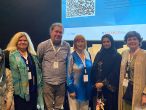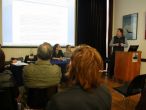INTANGIBLE CULTURE AND ITS INTERPRETATION IN MUSEUMS – Monday, November 16 at 16:00 CET.
We are very happy to invite you to our next Special #ICEthics #MeetingRoom on the topic of INTANGIBLE CULTURE AND ITS INTERPRETATION IN MUSEUMS on Monday, 16th of November at 16:00 CET.
Moderator: Dr. Lidija Nikočević, Board Member of IC Ethics
Panellists: Dr Marc Jacobs (Belgium), Leena Marsio (Finland), Jorijn Neyrinck (Belgium), Tamara Nikolić Đerić (Croatia), Joanne Orr (UK)
Please connect to the event by using this link:
Please find more information here:
Intangible cultural heritage (ICH) is regarded as heritage but at the same time as living traditions. Many communities, the holders of these traditions, are experiencing them as a vital part of their identity, sometimes even as something intimate that serves to strengthen the ties within the community.
When interpreted and made public within museums’ programs, another dimension and way of communicating of a living tradition occur, together with ethical dilemmas about the holders’ privacy, respect for their criteria regarding e.g. choices and evaluation, that might negatively influence the interaction between museums and communities. A group of experts will bring up some of these ethical dilemmas and problems that they have encountered in their practice.
Some more information about the speakers:
Marc Jacobs is professor and head of the department of heritage studies at the University Antwerp and holder of the UNESCO Chair for critical heritage studies and safeguarding intangible cultural heritage at the Vrije Universiteit Brussel. He has a PhD in history and has been working on many topics including popular culture (since the 1980s) and intangible heritage (21st century). He was the director of the UNESCO accredited NGO FARO. Flemish Interface for Cultural Heritage until 2019. He is involved in reflexively cultivating the 2003 UNESCO Convention Paradigm, from the drafting process in 2001 onwards.( https://www.uantwerpen.be/en/staff/marc-jacobs/)
Leena Marsio works in the Finnish Heritage Agency as Senior Advisor. She is the coordinator of the UNESCO Convention on the Safeguarding of the Intangible Cultural Heritage in Finland since 2014. She has a Master’s degree in Arts management from the Sibelius Academy and a BA from the University of Helsinki in Arts research. Before working for the Government, she worked ten years as a freelance researcher and producer in several organizations in the field of arts and culture both in governmental level, NGO’s and companies in Finland and abroad.
Jorijn Neyrinck is comparative anthropologist. Her driving force and main achievements lie in participatory living heritage practices and policies. From 2003 onwards Jorijn has coordinated the expertise centre on heritage participation tapis plein in Belgium. The organization transformed into Workshop intangible heritage in 2017, taking a leading role in the field regarding network cooperation around safeguarding ICH. A recent accomplishment is the ICH and Museums Project in Europe 2017-2020. Jorijn is trained facilitator for the UNESCO 2003 Convention, and a member of the Convention’s Evaluation Body until 2023.
PhD Tamara Nikolić Đerić (1983) senior curator, has been working for the Ethnographic Museum of Istria since 2008. Along with research, exhibition production, documentation, and digitization activities, she started and still runs the first Ethnographic film festival in Croatia, ETNOFILm, dedicated to visual documentation and interpretation of intangible cultural heritage and the ethnography of everyday life. Since 2014 Nikolić Đerić collaborates as professional program manager with Ecomuseum Batana (UNESCO Register of Good safeguarding practices, 2016). Since 2017 collaborates with UNESCO (Living Heritage Entity) as trainer for the implementation of the 2003 Convention for the safeguarding of ICH.
Joanne Orr has over thirty years of experience working in the fields of tangible and intangible heritage in the context of museums, wider heritage, communities and tourism in the UK and internationally. She has served as a Board member for ICOM UK and the UK National Commission for UNESCO and is a trained facilitator for the Global Capacity Building programme for the UNESCO 2003 Convention.






